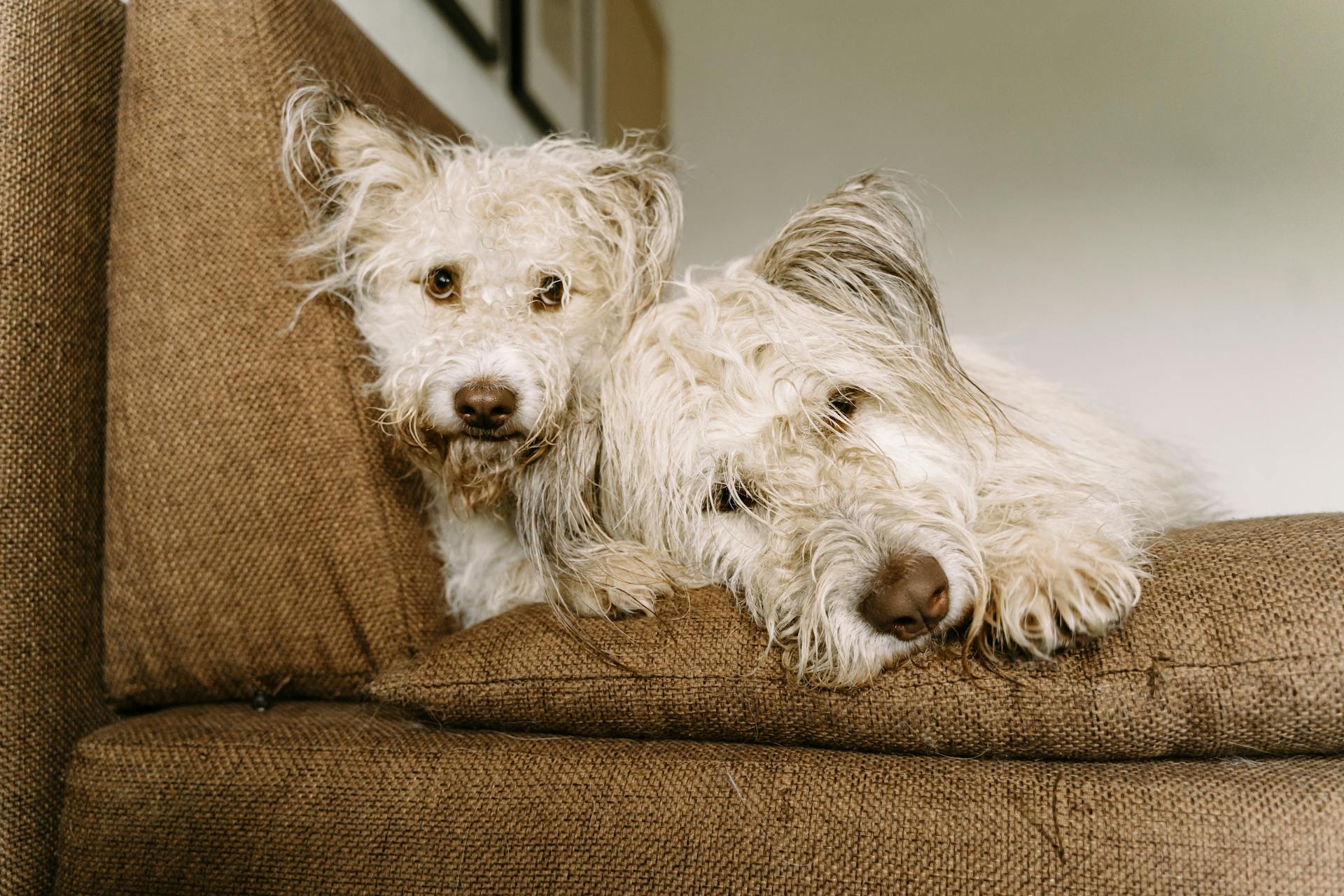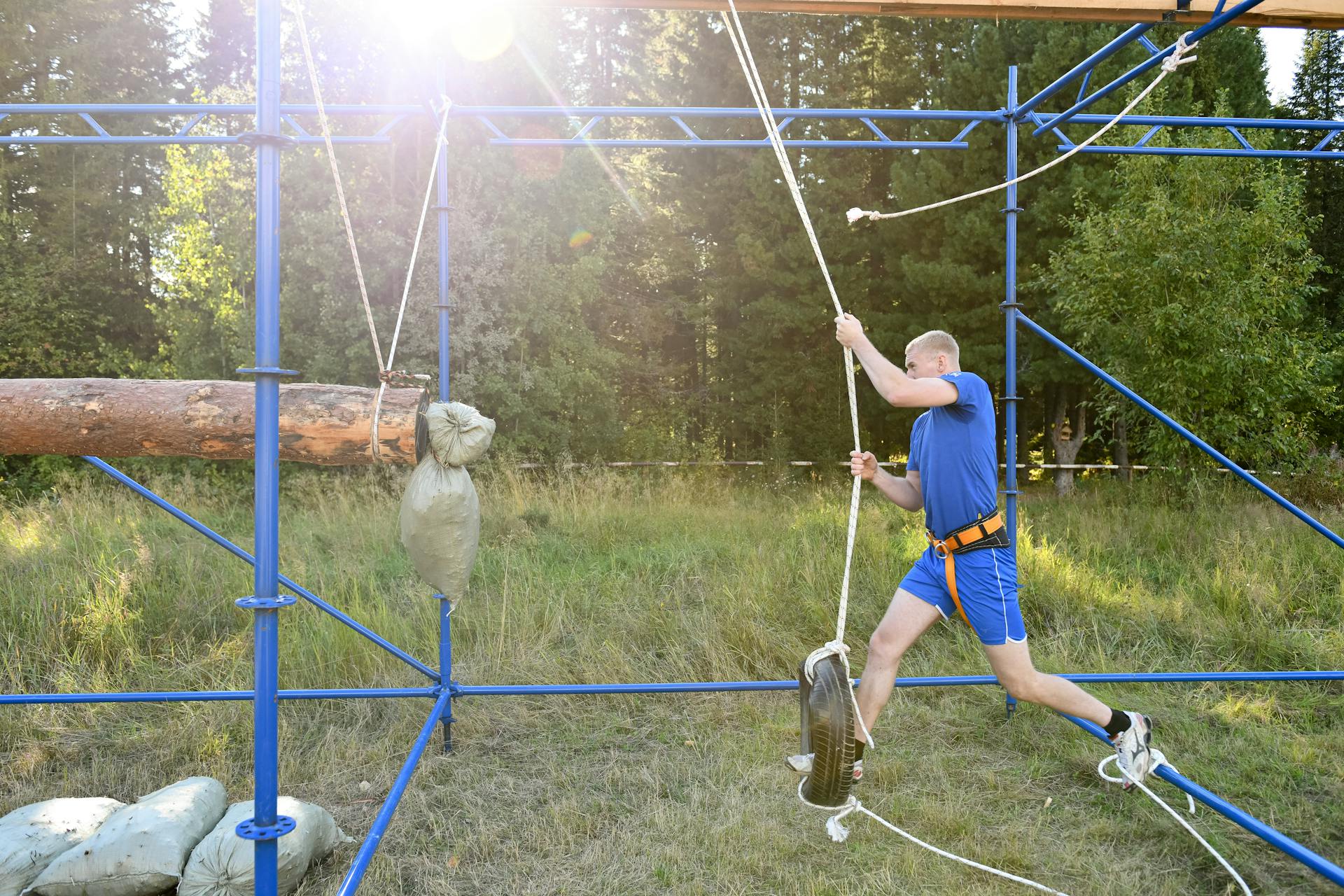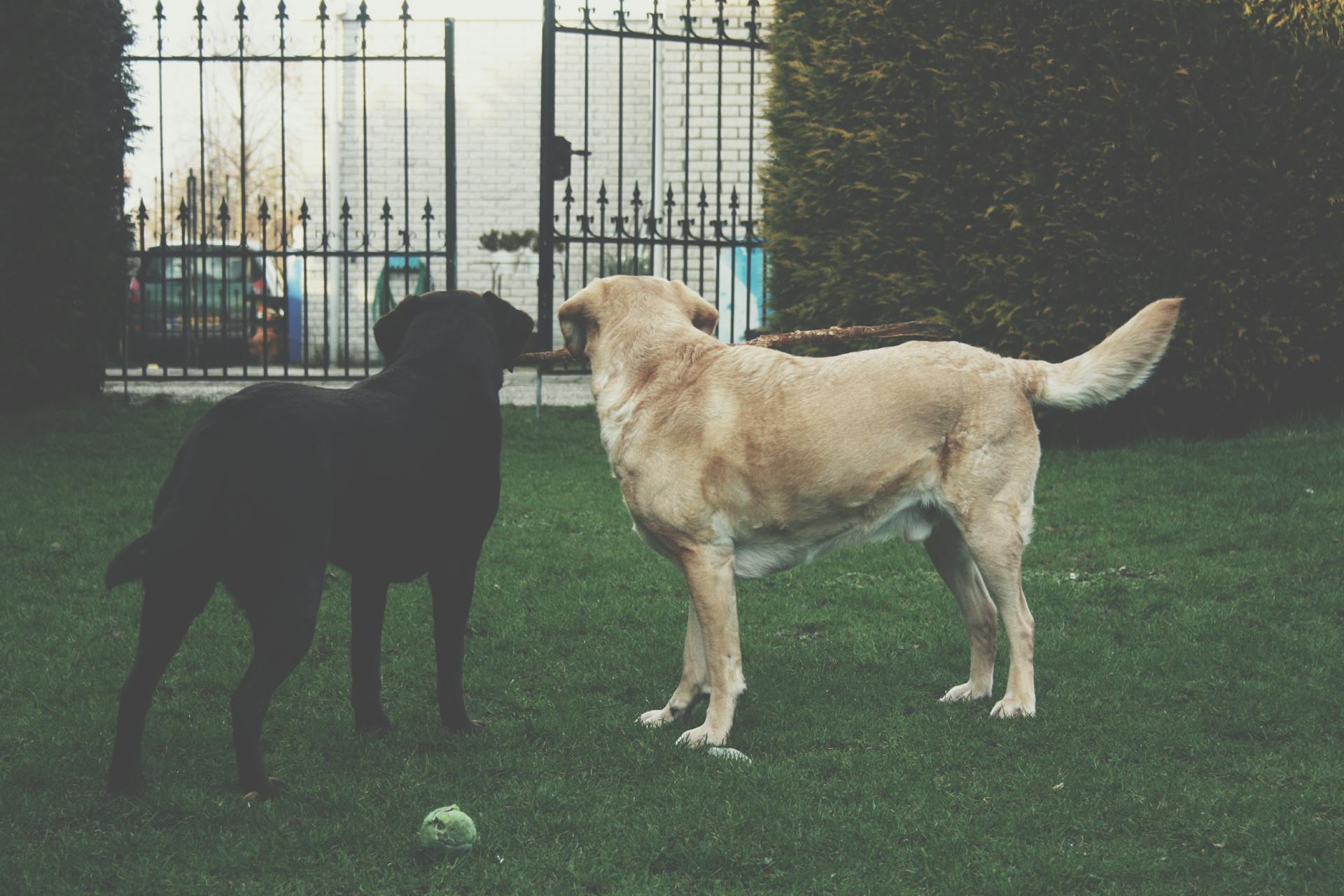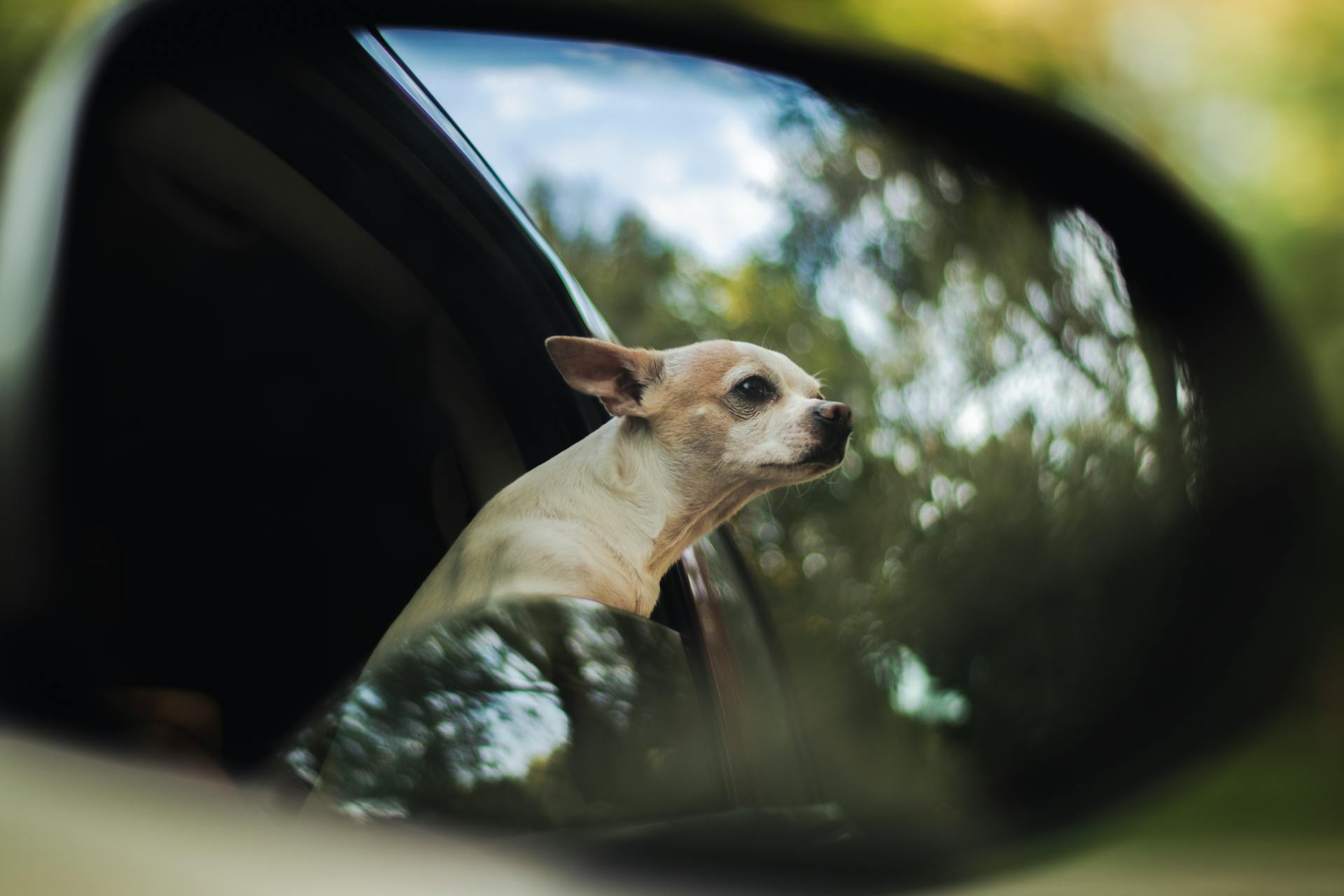
Chihuahuas can indeed suffer from separation anxiety, a common canine issue that affects many breeds. According to research, up to 20% of Chihuahuas experience separation anxiety.
Chihuahuas are highly attached to their owners and can become distressed when left alone. This attachment is rooted in their breeding history, as they were originally domesticated to be companions for the Aztecs.
Separation anxiety in Chihuahuas can manifest in destructive behavior, such as chewing and digging, as well as vocalization and pacing. In extreme cases, it can lead to self-soothing habits like excessive barking or howling.
Chihuahuas are intelligent dogs and can learn to cope with separation anxiety through training and exercise.
Signs and Symptoms
Dogs suffering from separation anxiety can exhibit a range of behaviors, including following their handler excessively.
Some common symptoms include pacing, excessive salivating, and excessive shaking, especially in smaller breeds like the Chihuahua and Yorkshire Terrier.
Dogs with separation anxiety may also vomit, engage in destructive chewing, and bark, howl, or whine excessively.
Urination and defecation in the house are common symptoms, as well as coprophagia, self-harm, digging and scratching at doors or windows, and escaping.
Anorexia and overactivity, such as excessive greeting or restlessness, can also be signs of separation anxiety.
Here are some common symptoms of separation anxiety in dogs:
- Pacing
- Excessive salivating
- Excessive shaking
- Vomiting
- Destructive chewing
- Barking, howling, whining
- Urination, defecation in the house
- Coprophagia
- Self harm
- Digging and scratching at doors or windows
- Escaping
- Anorexia
- Overactivity
Dogs with separation anxiety may also exhibit more general anxiety symptoms, such as aggression, drooling, panting, and destructive behavior.
These symptoms can be frustrating for owners and can cause damage to property, not to mention the unpleasantness of the cleanup.
In some cases, anxious dogs may work themselves up to the point that they pee or poop in the house, even if they are housebroken.
Destructive behavior is also common, with damage usually located around entry and exit points, like doorways and windows.
Attempts to break out of dog crates, windows, and even doors can result in painful injuries and expensive veterinary treatments.
What Causes Separation?
Separation anxiety is a common issue in dogs, and Chihuahuas are no exception. It's estimated to affect around 14 percent of dogs, making it a significant concern for many pet owners.
Traumatic events, such as a change in routine or a major life change, can trigger separation anxiety in dogs. This can include events like a new baby, a death in the family, or even a change in your work schedule.
Some dogs may develop separation anxiety due to extreme attachment or dependency on their owners. This can be a result of never previously being left alone or experiencing traumatic separation.
Life changes, such as a sudden switch in schedule or a move to a new house, can also contribute to separation anxiety in dogs. Even a single traumatic event, like a house being robbed, can have a lasting impact.
A lack of daily exercise has also been linked to separation anxiety in some research. This highlights the importance of providing regular physical and mental stimulation for your Chihuahua.
Here are some common triggers for separation anxiety in dogs:
- Major life change (e.g., new home, new baby, death of a family member, abandonment to a shelter)
- Extreme attachment or dependency on the owner
- Sudden switch in schedule
- Move to a new house
- Lack of daily exercise
Understanding these triggers can help you identify potential causes of separation anxiety in your Chihuahua and take steps to prevent or address the issue.
Diagnosis
Diagnosis can be a challenge with separation anxiety in dogs, as there are no specific diagnostic tests available.
Separation anxiety can occur at any point in a dog's life, but it often coincides with times of stress and major life changes.
Research has shown that strays and mixed breeds are more prone to separation anxiety, with diagnoses 56% and 67% higher respectively.
Traumatic experiences can contribute to the development of separation anxiety in dogs, especially if they've had a history of neglect or abuse.
To make an accurate diagnosis, pet professionals will examine a dog's behavior before and during departure, as well as when the owner returns home.
Recording a dog's behavioral responses after departure can increase the chances of an accurate diagnosis.
Repetitive behaviors like tachycardia, tachypnea, and trembling may be identified on a recording when the owner is away.
Urination and defecation are common behavioral responses in dogs experiencing separation anxiety, often occurring within 1-30 minutes after the owner's departure.
Destructive behavior, such as chewing, digging, and scratching, can also be present immediately after the owner leaves.
Vocal responses like whining, howling, and barking may precede or follow the owner's departure, and can persist for a longer period than other behavioral responses.
Treatment
Treatment for separation anxiety in Chihuahuas is available, but there's no instant cure. Treatment and management options can help alleviate symptoms, and consistent routines, lifestyle changes, or medication can help the disorder dissipate on its own.
A study in 2016 investigated the effects of imepitoin on reducing fear and anxiety-related behaviors in dogs, but it didn't specifically test its effects on separation anxiety. The study found a significant reduction in seizures per month, but no significant differences in anxiety-related behavior.
Talking with your veterinarian is the best way to treat anxiety in Chihuahuas. Your veterinarian can help identify the type of anxiety and possible causes and triggers, and rule out any other medical conditions.
A treatment plan usually involves a combination of training, preventive strategies, and in some cases, medications. Since excessive anxiety is often caused by a variety of factors, a multi-faceted approach is often the most effective way to treat it.
Discover more: Healthy Mind Canine - Separation Anxiety Training
Prevention Possible?
It can be difficult to predict exactly what will make your dog anxious. Even more difficult is determining if your dog's anxiety will develop into a more serious disorder.
However, there are ways to help a dog or puppy avoid anxiety-related problems. It's a good idea to start by understanding that anxiety in dogs can be caused by a variety of factors, including genetics, environment, and past experiences.
To prevent anxiety in Chihuahuas, it's essential to establish a routine that includes regular exercise, training, and socialization. This can help your dog feel more secure and confident in new situations.
Predicting exactly what will trigger your dog's anxiety can be challenging, but being aware of potential triggers can help you take steps to prevent anxiety-related problems.
Health Issues
Chihuahuas can become clingy due to various health issues.
A Chihuahua may cling to you more if they're not feeling well.
Some common health problems in Chihuahuas include Luxating patella, Tracheal collapse, and Tooth and gum disease.
Explore further: Common Health Problems with Chihuahuas
Older dogs with vision or hearing loss may become clingy because they must depend more on their owners.
Chihuahuas can also develop Hypoglycemia, a low blood sugar, which may cause them to seek extra attention.
If your Chihuahua is experiencing health issues, it's essential to take them to the vet as soon as possible.
Here are some common health issues in Chihuahuas:
- Luxating patella (when the kneecap moves out of place)
- Tracheal collapse (when the windpipe collapses)
- Tooth and gum disease
- Hypoglycemia (a low blood sugar)
- Hydrocephalus (a fluid buildup in the brain)
- Spinal injuries
- Obesity
- Scleritis (inflammation of the eye)
Chihuahua Behavior
Chihuahua behavior is shaped by their history as lap dogs and source of emotional support, making them naturally loyal and affectionate. Chihuahuas are known to be clingy and follow their owners around, sit on their lap, and even sleep in their bed.
Their clinginess is a result of their breeding and natural inclination to form strong bonds with their owners. Chihuahuas are perfect companions, keeping their owners company and snuggling up for warmth on chilly nights.
Chihuahuas can sometimes exhibit separation anxiety, which can manifest in barking, whining, destroying things, or even getting physically sick when left alone.
A unique perspective: Are Chihuahuas Good for First Time Owners
Socialization
Socialization is key to preventing anxiety in Chihuahuas. Proper socialization can prevent the development of anxiety.
Introducing your dog to new people, dogs, animals, places, and experiences can help avoid an exaggerated response down the road. This can help your dog become a well-adjusted canine citizen.
A lack of socialization can lead to clinginess in Chihuahuas. They can develop serious attachment issues if they don’t get enough exposure to new things when they’re young.
They may become barking, jumping on people, and even aggressive toward strangers. This is because they are so dependent that they don’t know how to behave to others.
In-person visits with other dogs can be great, but it’s not always an option. An alternative is to introduce your Chihuahua to new people, animals, and environments through virtual means.
On a similar theme: Why Do People like Chihuahuas
Age
As your Chihuahua ages, they may become less active and less interested in playing, leading them to become more attached to you.
Take a look at this: How to Become a Dog Trainer for Service Dogs
Their reliance on you can be especially true for those that experience health issues, such as vision problems that may cause them to become more dependent on their humans to guide them.
Dementia in dogs can also cause confusion and anxiety, leading them to cling to their owners.
This change in behavior can be a natural part of your Chihuahua's life, but it's essential to continue providing them with love, care, and attention as they age.
Chihuahua Behavior
Chihuahuas are naturally clingy dogs and crave constant attention and affection from their owners.
Their history as a lap dog and source of emotional support is responsible for this clingy behavior.
Chihuahuas are perfect companions and keep their owners company, but their clinginess can sometimes lead to separation anxiety.
Proper socialization can prevent the development of anxiety and help your dog become a well-adjusted canine citizen.
Introducing your dog to new people, dogs, animals, places, and experiences can help avoid an exaggerated response down the road.
For your interest: Why Are German Shepherds so Clingy
Chihuahuas require a lot of attention, and experts call them "lap dogs" because they desire to cuddle up with their owners.
Age can play a role in causing your Chi to rely more on you, especially if they experience health issues or dementia.
Teaching your puppy to be on their own in another room, even when you're at home, can help develop independence and reduce clinginess.
Don't encourage overly clingy behavior, but instead, play it cool when you leave or return home to avoid making a big deal out of it.
If you get worked up, your dog will see your comings and goings as a major event to worry over, which can worsen the problem.
Punishing your dog for damage or accidents when you return home will only add to their anxiety and make the problem worse.
Chihuahuas are naturally prone to separation anxiety, which can cause barking, whining, destroying things, or even getting physically sick when you leave them alone.
A lack of socialization can contribute to clingy behavior, so make sure to introduce your dog to new people, dogs, animals, and environments.
For more insights, see: Dog Training Issues
Crate training can help reduce anxiety and destructive behavior in your Chihuahua, providing them with a safe space when you're not around.
Gradually increasing alone time can help your dog get used to being alone and reduce separation anxiety.
Ignoring clingy or attention-seeking behavior can help reduce attention-seeking responses and decrease your dog's dependency on you.
Systematic desensitization and counterconditioning can be effective in managing separation anxiety and changing your dog's response to the stimuli responsible for anxiety.
A unique perspective: Dog Attention Seeking Behaviour
Research
Research has shown that changes in primary metabolites can be linked to anxiety-related behavior in dogs. A 2016 study identified 13 metabolites that differed between dogs with separation anxiety and those without.
These metabolites play a role in controlling oxidative stress, tryptophan levels, and lipid metabolisms. The changes in these metabolites suggest that they may be potential biomarkers for canine anxiety.
Past Experiences
Past experiences can greatly impact a Chihuahua's behavior. A Chihuahua that has experienced trauma or neglect may become clingy to seek comfort and security.
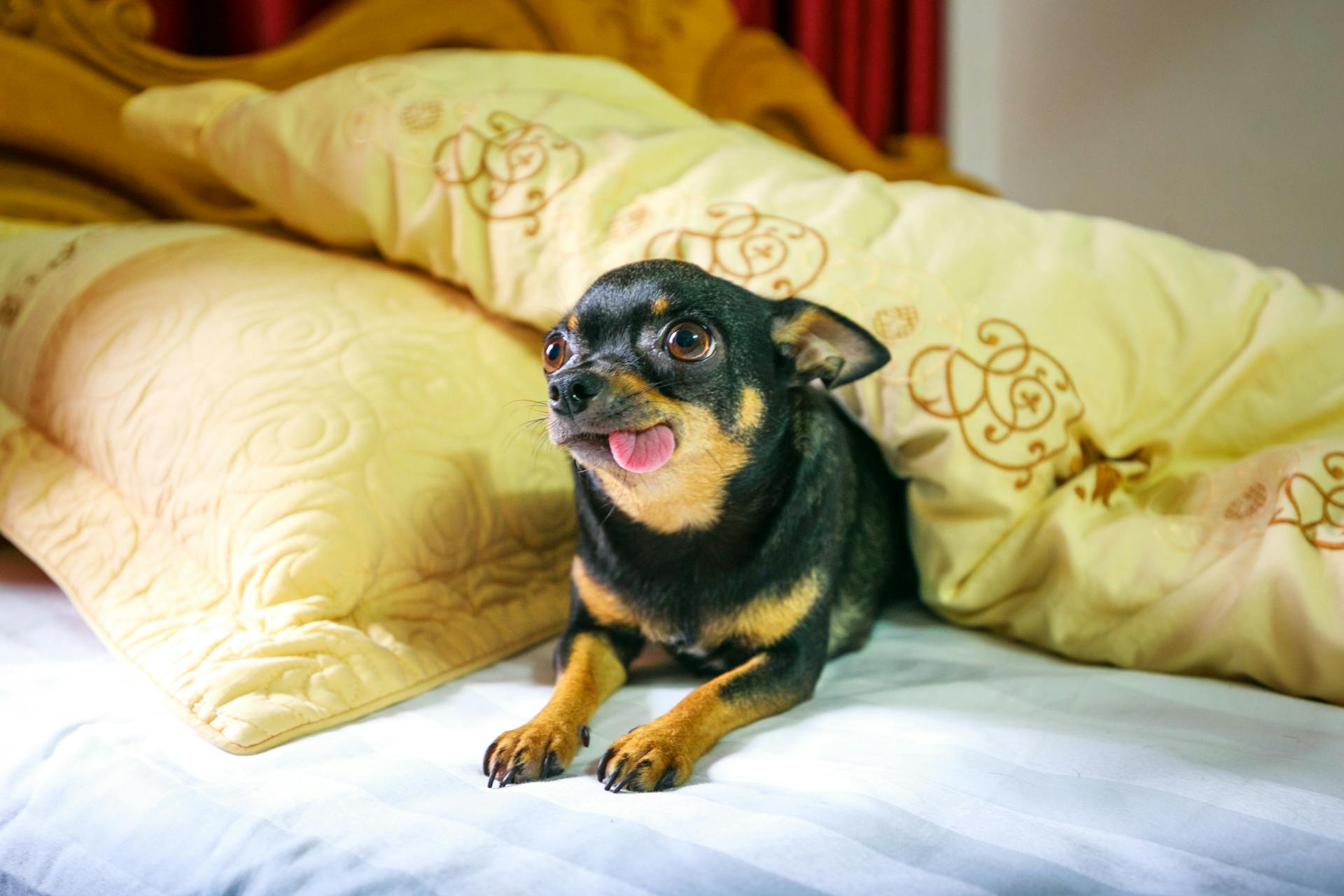
If a Chihuahua has had negative experiences, they may become more attached to their owner to seek comfort and security. They're saying, "Please don't leave me again!"
A Chihuahua that has been abused may become anxious and fearful, even becoming aggressive towards strangers. This is a natural response to feeling scared and vulnerable.
Research
Research has shown that primary metabolites can play a significant role in canine anxiety.
A study conducted in 2016 identified changes in thirteen metabolites between dogs with and without separation anxiety.
Primary metabolites are involved in natural processes, such as reproduction and development, and abnormal differences can result in differences in mental development.
Changes in metabolites like hypoxanthine, indoxysulfate, and phospholipids were found to control oxidative stress, tryptophan levels, and lipid metabolisms in anxious dogs.
Biomarkers like primary metabolites can help identify possible causes of anxiety in dogs.
Consider Crate Training
Consider crate training as a potential solution to help reduce your Chihuahua's anxiety and destructive behavior when you're not around.
A crate can provide your pup with a safe, quiet place to relax, and when used correctly, it can be a valuable training tool.
Some Chihuahuas feel safer and more comfortable in their crate when left alone, but others can panic, so it's essential to watch your puppy's behavior and adjust accordingly.
The goal is not to crate your dog all day, every day, but to use it as a temporary solution to keep them and your house safe while teaching them to enjoy being alone.
To make crate training successful, teach your Chihuahua to associate their crate with positive things like chew toys and food-releasing puzzle toys.
See what others are reading: Crate Training a Dog during the Day
Desensitization and Counter-Conditioning
Desensitization and counter-conditioning are key techniques for helping your Chihuahua feel more comfortable with separation. By leaving your puppy for short periods and gradually increasing the time, you can teach them that being alone has its rewards.
Start by leaving your puppy with a high-value treat they love, and they might even begin to look forward to your departure. This can be especially helpful if your puppy already gets anxious when they know you're leaving.
To make your departure routine less distressing, try desensitizing your puppy to the signs you're about to go out, like picking up your keys or putting on your coat. Tossing them a treat right before you touch these items can help them associate these actions with positive outcomes.
Readers also liked: Puppy Zoomies and Biting
Fear
Chihuahuas can be fearful and anxious, which makes them clingy or reactive. This is because they may look at you for comfort and security when they feel stressed or scared.
Leaving them alone can trigger anxiety or aggression in Chihuahuas. They may become reserved when meeting new people, especially strangers.
Being small can make Chihuahuas feel insecure, and they need extra reassurance from you. During loud events like thunderstorms or fireworks, they might want to be close to you for comfort.
Chihuahuas are natural protectors, and they want to feel safe and secure.
Desensitization and Counter-Conditioning
Desensitization and Counter-Conditioning is a powerful tool for helping your dog feel more comfortable in the world and form positive associations with new experiences. It's essential for teaching your puppy that separation has its rewards.
Start by leaving your puppy for very short periods of time and gradually lengthen the amount of time you're gone. This will help them get used to being alone. If your puppy already gets anxious when you leave, try using a high-value treat to counteract that reaction.
Related reading: 6 Month Old Puppy Resource Guarding
Using a high-value treat right before you leave can actually make your puppy look forward to your departure. It's a great way to associate your leaving with something positive. You can also make your departure routine less distressing by desensitizing your puppy to the signs you're about to go out.
Pick up your keys or put on your coat, then go make dinner rather than heading to the car. This will help your puppy get used to the signs of your departure without panicking. Tossing a high-value treat right before you touch your keys or coat can also help them look forward to the signs.
On a similar theme: Signs of Prey Drive in Dogs
Medications and Supplements
SSRIs and antidepressants like fluoxetine and clomipramine are occasionally prescribed for dogs with anxiety, including separation anxiety.
Your veterinarian may prescribe a medication like benzodiazepine in conjunction with an antidepressant to help your dog cope with predictable anxiety-producing events like thunderstorms.
Senior dogs with cognitive dysfunction syndrome may benefit from selegiline, which can help reduce some symptoms of CDS, and is also used for treating chronic anxiety in Europe.
Check this out: Will Getting a Male Dog Fixed Help with Aggression
Some natural products use pheromones and aromatherapy to reduce anxiety, and can be used alone or in conjunction with other medications.
Dog-appeasing pheromone collars or diffusers can also be effective in reducing separation anxiety.
CBD and valerian are natural products that might bring your dog relief from separation anxiety.
However, it's essential to consult with your vet before giving your dog any over-the-counter products, particularly if they are already on prescription medications.
Medications like amitriptyline and alprazolam are prescribed for anxiety and panic disorders, but require a prescription and consultation with your vet.
Pet Releaf's USDA-certified organic CBD chews and oils are safe and effective, using third-party testing to ensure quality products, and are designed by veterinarians for dogs of all sizes, ages, and health statuses.
You might enjoy: Cbd for Chihuahuas
Sources
- https://en.wikipedia.org/wiki/Separation_anxiety_in_dogs
- https://caninecarecentral.com/behavior/why-are-chihuahuas-so-clingy/
- https://www.akc.org/expert-advice/health/treating-dog-anxiety/
- https://www.akc.org/expert-advice/training/dog-separation-anxiety/
- https://relaxmydog.com/blog/breeds-prone-to-separation-anxiety
Featured Images: pexels.com
